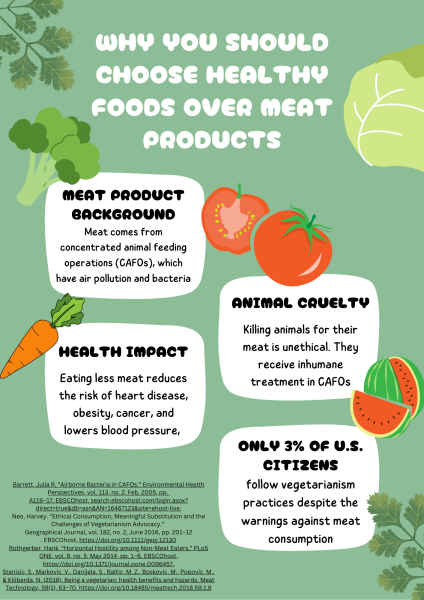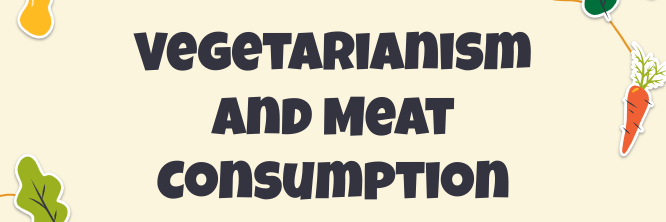Advisor’s Note: This article was written by an AP Seminar student as part of a “Make a Difference” project. For the AP Seminar Performance Tasks that are scored by College Board, students spend their year researching and writing about real-world, complex issues. After the AP test, students choose one of the topics they studied and do something to raise awareness about the issue to shed light on it as a way to make even a small difference. Students have a variety of options including developing websites, creating posters, starting social media campaigns, writing letters, and – this year – writing articles for Cardinal Nation. Student Kylie Sheehan chose to share her issue in Cardinal Nation. Here is Kylie’s submission.
There are 1.5 billion people on Earth who are vegetarians (Phoenix, 2023). Vegetarian diets consist of only eating dairy, eggs, fruits, and vegetables. These vegetarian diets have multiple health benefits and mental benefits. Adopting a no-meat diet can result in lower obesity rates, lower systolic blood pressure, lower risk of heart problems, and lower risk of cancer (Stanisic et al, 2018). Vegetarian diets also have impactful benefits for the environment. These diets reduce greenhouse gas emissions from livestock. Livestock are the biggest contributors to global warming (Shultz, 2020). Nitrogen will also be released into the environment due to livestock farming. When people cut back on meat or fully adopt a vegetarian diet, they contribute to bettering themselves and the environment. Informing more people about vegetarian diets can overall improve society and encourage more people to eat healthier.
Health Benefits

The health benefits associated with vegetarian diets are some of the main reasons someone might go vegetarian. Vegetarian diets help with systolic blood pressure, decrease the risk of death, decrease the risk of heart problems, and lower obesity. Cardiovascular and cancer risks increased by 18% for every 50g of meat consumed (Stanisic et al, 2018). However, a majority of vegetarians eat fake meats in replacement of real meat. These fake meats still pose risks for cancer to occur. Considering that cancer is one of the most life-changing risks, it would be best for vegetarians to steer clear of any type of meat if they are in it for health benefits.
Vegetarians also tend to get better sleep. Better sleep allows them to feel more replenished. This high-quality sleep increases their mental health. Additionally, it was proven that vegetarians have higher self-respect because of their proper eating habits which also contributes to better mental health (Kaushik et al, 2015).
Environmental Benefits
Choosing a diet that would be beneficial for someone’s health and the environment would be most optimal. Not consuming meat helps protect the planet from climate change (Wallis, 2017). Meat production is a leading cause of global warming and climate change because of the greenhouse gases released into the air from the production of meat. In fact, 25% of greenhouse gases are produced from human nutrition (Abeliotis, 2016). Every year, global warming rates increase solely based on the actions taken by humans. Many would not consider what they eat to impact the environment around them greatly; however, this would be inaccurate.
Additionally, with the continuously growing population, people would likely not be able to produce enough food to sustain the current eating trends in consideration of the population (Brazier, 2008). It has been shown that farmers can produce twice as much food using plant-based products compared to meat-based ones. However, this can also be detrimental to the environment. The use of fertilizers poses a negative impact on the environment due to the chemicals in them.
Final Thoughts
Vegetarian diets consist of impactful health and environmental benefits. Considering this, a better environment can ultimately positively affect someone’s health. Bringing awareness to this matter can positively impact people, animals, and plants. A vegetarian diet’s health benefits consist of better blood pressure and lower chances of obesity, cancer, and heart problems. Meat-based diets contribute to increased rates of global warming and climate change. Adopting a vegetarian diet can decrease these rates. Overall, adopting a vegetarian diet can be most beneficial for a person individually and their environment.
References
Chris Brazier (2008). Meat’s too expensive: Chris Brazier believes that having flesh at the centre of our diets is both unjust and unsustainable.
Ian Wallis (2017). Is vegetarianism bad for the environment? Division of Evolution, Ecology and Genetics, Research School of Biology, Australian National University, Canberra ACT 0200, Australia
Konstadinos Abeliotis (2016). The Effect of Different Typers of Diet on Greenhouse Gas Emissions in Greece (Albeliotis). Int. J. Food System Dynamics 7 (1), 2016, 36-49. http://dx.doi.org/10.18461/ijfsd.v7i1.714
Kumar Kaushik, N., Aggarwal, A., Singh, M., Deswal, S., & Kaushik, P. (2015). Vegetarian Diets: Health Benefits and Associated Risks. International Archives of Integrated Medicine, 2(3), 206–210.
Phoenix, S. (2023, May 22). Vegetarian Statistics 2023 | Surprising Facts & Data. Great Green Wall. Retrieved November 8, 2023, from https://www.greatgreenwall.org/supplements/vegetarian-statistics/
Schultz, Michael M. (2020). “A balanced perspective on the importance of extensive ruminant production for human nutrition and livelihoods and its contribution to greenhouse gas emissions.” South African Journal of Science. Sep/Oct2020, Vol. 116 Issue 9/10, p115-117. EBSCOhost,
Stanisic, S., Markovic, V., Danijela, S., Baltic, M. Z., Boskovic, M., Popovic, M., & Kilibarda, N. (2018). Being a vegetarian: health benefits and hazards. Meat Technology, 59(1), 63–70. https://doi.org/10.18485/meattech.2018.59.1.8






